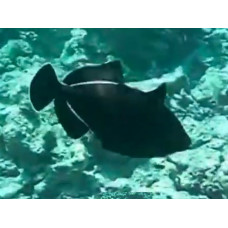Latin name
Melichthys indicus
Other name
Black-finned triggerfish
Identification
This species should not be confused with Melichthys niger, which is often mistaken for Indian Triggerfish. Indian Triggerfish have never been found near Hawaii, but the two species are very similar in shape and colouration.
Features of fish fins
Dorsal spines (total): 3; Dorsal soft rays (total): 30 - 35; Anal spines: 0; Anal soft rays: 27 - 30.
Fish colouring
Indian Triggerfish have a brown body and black fins with white stripes at the base of the dorsal and anal fins. There is a narrow white band around the caudal fin.
Distribution
Widespread throughout the Indian Ocean: Red Sea and East Africa east to western Thailand and Indonesia.
Habitat
A tropical marine reef species. Their depth range is from 1 to 30 metres. They live on coral-rich reef slopes facing the sea.
Size
Indian Triggerfish can grow to 25 centimetres in length.
Behavior
Occurs singly. Digs burrows under coral reefs for shelter. Often very aggressive towards its eggs, but otherwise harmless.
Food and feeding habits
Usually feeds on hard-shelled molluscs and echinoderms, but some species feed on algae and zooplankton.
Reproduction
An egg-laying fish species that clearly mates during reproduction.
Fishing
This species is commercially important for fishing. It's caught with artisanal gear.
Relationship with a person
Harmless. Indian Triggerfish are very easy to keep at home, some are peaceful but some are very aggressive towards other fish.
| Classification | |
| Phylum | Chordata |
| Class | Actinopterygii |
| Squad | Tetraodontiformes |
| Family | Balistidae |
| Genus | Melichthys |
| Species | M. indicus |
| Features | |
| Conservation status | Least Concern |
| Habitat | Pelagic |
| Life span, years | No information |
| Maximum body weight, kg | No information |
| Maximum length, cm | 25 |
| Sailing speed, m/s | No information |
| Threat to people | Edible |
| Way of eating | Planktonophage |
Indian triggerfish
Tags: indian triggerfish



